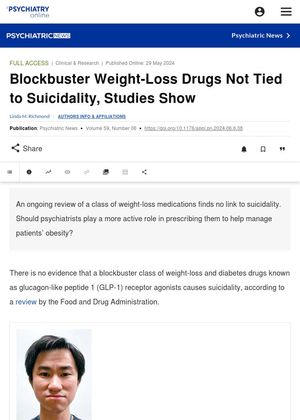Blockbuster Weight-Loss Drugs Not Tied to Suicidality, Studies Show
May 2024
in “
Psychiatric News
”

TLDR Weight-loss drugs are not linked to suicidal thoughts.
A review by the FDA found no evidence linking GLP-1 receptor agonists, a class of weight-loss and diabetes drugs, to suicidality. An independent large clinical trial with over 105,000 participants showed that those taking semaglutide were 27% less likely to experience initial suicidal ideation compared to those on non-GLP-1 obesity medications. The FDA continues to monitor for potential risks, including suicidal thoughts, aspiration, and alopecia. Psychiatrists are encouraged to play a more active role in managing obesity, especially in patients with serious mental illness, by incorporating holistic weight management plans and collaborating with specialists. Despite the benefits, high costs of these medications remain a significant barrier.




